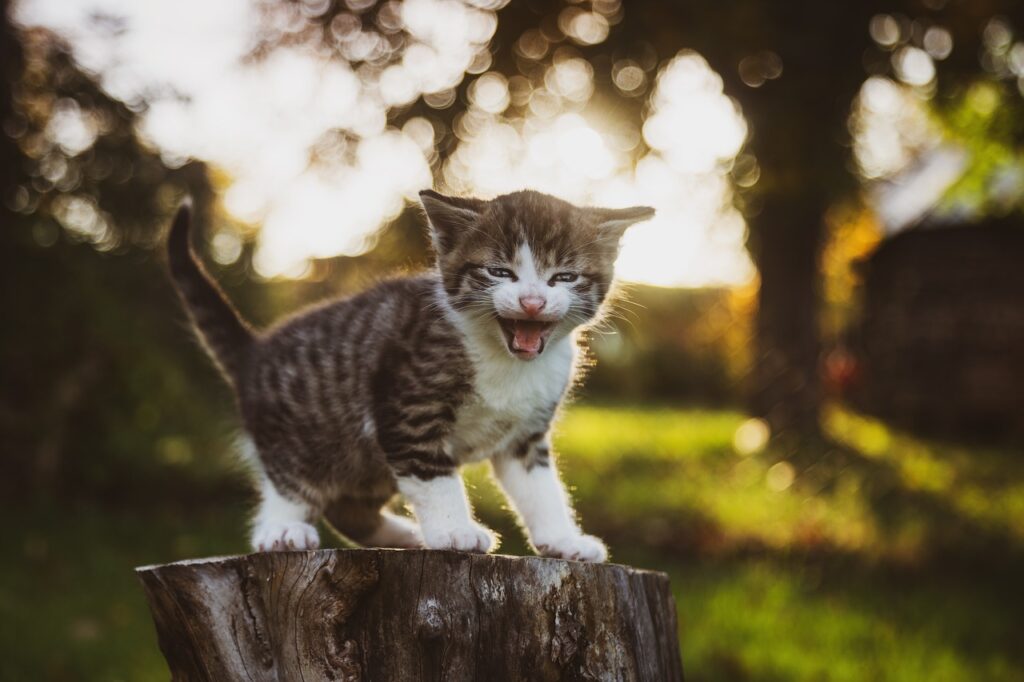Can Cats Eat Pancakes? – No, They Can’t
When it comes to sharing our breakfast favorites with our feline friends, pancakes should not be on the menu. While a tiny nibble of a pancake without syrup or toppings is unlikely to harm a cat, regular consumption can be unhealthy. Pancakes contain flour and often sugar, neither of which are necessary in a cat’s diet and can contribute to obesity and other health issues when ingested in large amounts.
Can Kittens Eat Pancakes?
No, kittens especially should steer clear of pancakes. A kitten’s diet needs to be rich in nutrients that are vital for growth and development. Pancakes offer no nutritional value to kittens and can upset their delicate digestive systems, potentially distracting from their essential growth-focused nutrition.
Things to consider when feeding Pancakes to kittens?
If a kitten accidentally consumes a small piece of pancake, it’s unlikely to be dangerous, but it is not recommended to make it a habit. Their developing bodies require specially-formulated kitten food that is high in protein and specific nutrients, without the unnecessary and potentially harmful fillers and sugars found in pancakes.
Nutritional Benefits of Pancakes for Cats – Why Cats Can’t Have Pancakes
Carbohydrates Overload
Pancakes are high in carbohydrates, which cats have a limited ability to process. Unlike humans, cats are obligate carnivores, meaning they derive their nutrition mainly from meat, not from carbohydrates.
No Essential Nutrients
Pancakes lack the essential nutrients cats require, such as taurine, arginine, and various vitamins and minerals that are commonly found in a meat-based diet.
Sugar Content
The sugar content in pancakes, particularly if syrup is added, can lead to obesity and diabetes in cats over time.
Possible Lactose Intolerance
Many cats are lactose intolerant, and since pancakes are typically made with milk, this can cause digestive upset.
Contains Gluten
Gluten, found in the wheat flour used to make pancakes, offers no benefit to cats and can cause a reaction in those with sensitivities.
Potential Allergies: Can Cats Be Allergic to Pancakes?
While allergies to pancakes in cats are rare, they can be allergic to certain ingredients within them, such as wheat (gluten) or dairy products.
Symptoms of Pancake Allergies in Cats
- Itchy Skin: Look for your cat scratching more than usual or developing sores from excessive grooming.
- GI Upset: Vomiting or diarrhea can be a sign of an allergic reaction or just a general intolerance.
- Respiratory Issues: In some rare cases, cats might exhibit coughing, wheezing, or other breathing difficulties.
What to Do If Your Cat Shows Symptoms?
- Consulting a Vet: A veterinarian can provide guidance and treatment if allergy symptoms appear.
- Dietary Review: Your vet may suggest a change in your cat’s diet to identify and eliminate the cause of the allergic reaction.
- Medication: In some cases, the vet may prescribe medications to alleviate symptoms.
Recommended Amount: How Much Pancakes Can a Cat Consume?
Cats should not consume pancakes as part of their regular diet. If a cat accidentally eats a pancake piece, monitor them for any adverse reactions and avoid repeated exposure.
Things to Consider When Feeding Pancakes to Cats
Cats have much different nutritional needs compared to humans; thus, offering human food like pancakes can disrupt their balanced diet. Always consult your veterinarian before introducing new foods to your cat’s diet.
How to Feed Pancakes to Cats: A Quick Guide
Although pancakes are not recommended for cats due to health concerns and nutritional mismatches, some pet owners might still wish to offer a tiny piece as an occasional treat. This should be done sparingly and cautiously, with close observation for any unusual symptoms post-consumption.
Plain Pancake Morsel
If you choose to treat your cat to a pancake, ensure it is plain, with no added sugar, sweeteners, or toppings, and only provide a small, bite-sized piece.
Cat-Friendly “Pancake”
A safer alternative is to create a ‘pancake’ from pureed meat or cat food, cooked thinly in a pan without any additives or seasonings.
Special Occasion Treats
On special occasions, consider a small taste of plain cooked egg or a piece of cooked, unseasoned chicken as a healthier treat option for your cat.
Conclusion
While sharing your breakfast might be tempting, remember that cats have very different nutritional needs than humans. A piece of plain pancake might not be harmful in isolation but offers no health benefits to your cat and can potentially cause harm. It is always best to opt for cat-friendly treats that contribute positively to their well-being.



